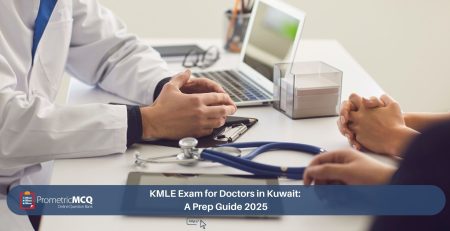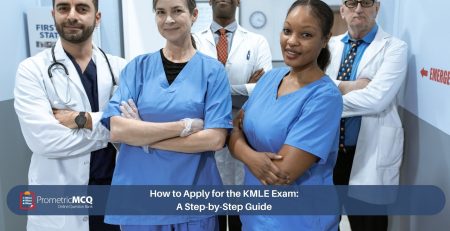
Top Mistakes to Avoid in Your KMLE Exam Preparation
fatima@prometricmcq.com2025-09-24T14:20:53+00:00Table of Contents
ToggleTop Mistakes to Avoid in Your KMLE Exam Preparation (2025)
The Kuwait Medical Licensing Examination (KMLE) stands as a crucial milestone for every healthcare professional aiming to practice in Kuwait’s esteemed medical sector. It’s a challenging, high-stakes exam that tests not just your knowledge, but your clinical judgment and ability to perform under pressure. Every year, countless highly intelligent and well-qualified candidates fail, not due to a lack of knowledge, but because they fall victim to a series of common, avoidable preparation mistakes. Success in the KMLE is as much about having the right strategy as it is about having the right information.
Studying hard is not the same as studying smart. Pouring endless hours into inefficient methods can lead to burnout, anxiety, and ultimately, a disappointing result. The path to passing the KMLE on your first attempt is paved with a strategic, focused, and error-free preparation plan. Recognizing the potential pitfalls before you encounter them allows you to navigate the demanding study period with confidence and efficiency, maximizing your chances of success.
This ultimate 2025 guide is dedicated to illuminating the most critical mistakes candidates make while preparing for the KMLE across all professions—doctors, dentists, nurses, and pharmacists. We will not only identify these errors but also provide actionable solutions and a strategic framework to keep your preparation on track. Supported by a comprehensive 10-point FAQ section, this article will serve as your essential checklist for what *not* to do, ensuring your hard work translates directly into a passing score.
Key Takeaways on Avoiding KMLE Mistakes
- Active Learning is Mandatory: The biggest mistake is passive learning (reading/watching). You must engage in active learning (solving MCQs).
- Don’t Just Use a QBank, Master It: Merely doing questions is not enough. The real learning happens when you deeply analyze the rationales for both correct and incorrect answers.
- Create and Stick to a Schedule: “Winging it” is a recipe for failure. A structured, realistic study schedule is essential for covering the vast syllabus.
- Focus on High-Yield, Not Everything: Trying to learn every detail is impossible and inefficient. Prioritize high-yield topics relevant to your profession.
- Simulate the Real Exam: Avoid the trap of only practicing in untimed, tutor mode. Regular, full-length mock exams are crucial for building stamina and perfecting time management.
The Top 8 Mistakes in KMLE Preparation (And How to Fix Them)
Let’s dive into the most common errors that can sabotage your KMLE preparation and discuss the concrete steps you can take to avoid them.
Mistake #1: Relying on Passive Learning
The Trap: This is the single most common and detrimental mistake. You spend months passively reading textbooks, highlighting notes, and watching video lectures. While you feel productive, your brain is not being trained to do what the exam requires: retrieve information, analyze a clinical scenario, and make a decision under pressure. Passive learning leads to poor knowledge retention and a false sense of security.
The Solution: Embrace Active Recall. Your study time should be dominated by active learning. The most effective form is practicing with a high-quality question bank. Every time you solve a case-based MCQ, you are forcing your brain to actively recall information and apply it, which strengthens neural pathways and dramatically improves long-term memory. This principle is a cornerstone of effective learning, as detailed in many cognitive science studies, such as those published by the National Center for Biotechnology Information (NCBI).
Mistake #2: Using Question Banks Incorrectly
The Trap: You’ve purchased a QBank, but you’re only using it as an assessment tool to see your score. You quickly move from one question to the next, focusing only on whether you got it right or wrong. You ignore the detailed explanations, especially for the options you correctly guessed.
The Solution: Treat Your QBank as Your Primary Study Tool. The learning is in the rationales. For every single question, you must read the entire explanation. Understand why the correct answer is correct and, just as importantly, why every other incorrect option (the distractors) is wrong. This process deepens your understanding of the topic, exposes you to different presentations of a disease, and trains you to recognize subtle clues in the question stem.
Mistake #3: Having No Structured Study Plan
The Trap: You study sporadically, tackling whatever topic you feel like on a given day. There’s no long-term schedule, no weekly goals, and no way to track your progress. This haphazard approach almost always leads to neglecting entire sections of the syllabus and frantic, inefficient cramming in the final weeks.
The Solution: Design a Realistic, Subject-Based Schedule. A good plan for the KMLE, which is detailed in our general KMLE exam guide, involves breaking your preparation into blocks. For example, dedicate one week to Cardiology, the next to Pulmonology, and so on. In each block, spend the first 2-3 days reviewing the core concepts from a textbook, then spend the remaining 4-5 days solving hundreds of MCQs on that specific topic.
Mistake #4: Failing to Simulate Exam Conditions
The Trap: All your practice is done in “tutor mode”—untimed, with the answer available immediately. You never experience the pressure of the clock or the mental fatigue that sets in during a 3-hour exam. On exam day, you struggle with pacing, run out of time, and make careless errors due to stress.
The Solution: Incorporate Timed Mock Exams. Starting from at least 6-8 weeks before your exam, you must take regular, full-length, timed mock exams. Simulate the real experience as closely as possible: 150 questions in 180 minutes, no interruptions, no looking up answers. This builds mental stamina, helps you find your optimal pacing, and makes the real exam feel familiar and less intimidating.
Mistake #5: Underestimating Calculations
The Trap: This is particularly relevant for pharmacists, nurses, and doctors. You assume you’re “good enough” at math and only briefly review calculation formulas. You don’t dedicate time to repetitive practice. On the exam, you’re faced with multi-step dosage or infusion rate problems and either get them wrong or waste precious time.
The Solution: Aim for 100% Accuracy Through Daily Practice. Calculation questions are “free points” if you are prepared. They are black and white, with no room for ambiguity. Dedicate 15-20 minutes every single day to solving a few calculation problems. Practice all types: dilutions, allegations, flow rates, and dose adjustments. Your goal is to be so proficient that you can solve them quickly and with absolute confidence.
Mistake #6: Ignoring Your Well-being (Burnout)
The Trap: You adopt a “more is more” mentality, studying 12-14 hours a day, sacrificing sleep, nutrition, and exercise. Your productivity plummets, your anxiety skyrockets, and you approach the exam in a state of physical and mental exhaustion. A tired brain cannot think critically.
The Solution: Prioritize Health and Balance. A sustainable study plan must include adequate rest. Aim for 7-8 hours of quality sleep per night. Incorporate at least 30 minutes of physical activity daily. Take scheduled breaks during your study sessions (e.g., the Pomodoro Technique). A healthy, rested mind is far more efficient and resilient.
Mistake #7: Using Outdated or Too Many Resources
The Trap: You’re studying from a textbook that is 10 years old, or you’re trying to read from five different textbooks for a single topic. Old resources contain outdated clinical guidelines, which will lead you to choose the wrong answers. Using too many resources leads to information overload and a lack of depth in any single one.
The Solution: Choose a Few High-Quality, Current Resources. Select one core, up-to-date textbook for each major subject (e.g., a recent edition of Harrison’s for Internal Medicine). Your most important resource should be a single, comprehensive QBank that is regularly updated. Stick to these core resources and master them.
Mistake #8: Neglecting Exam Day Logistics
The Trap: You’ve spent months studying but fail to plan for the day itself. You’re unsure of the Prometric center’s location, you forget your valid passport, or you arrive late and flustered. This easily avoidable stress can significantly impact your performance before you even answer a single question.
The Solution: Plan Your Exam Day Meticulously. Weeks in advance, confirm the location of your test center and plan your travel time. The day before, lay out everything you need: your original, valid passport (the only ID accepted) and your confirmation letter. Ensure the name on your passport exactly matches your application. Eat a good meal, get a full night’s sleep, and arrive at the center early.
Frequently Asked Questions (FAQs) on KMLE Preparation Mistakes
The overwhelming consensus is that relying on passive learning (reading and watching) instead of active learning (solving a high volume of MCQs) is the number one reason for failure. The exam tests application, not just knowledge, and only active practice can build this skill.
While there is no magic number, most successful candidates complete between 2,000 and 3,000 high-quality, relevant practice questions. The key is to thoroughly review the rationale for every question, which makes the number of questions less important than the quality of the review.
Yes, this can be a mistake. While you should dedicate extra time to your weak subjects, you must also continue to review your strong areas to prevent your knowledge from decaying. A balanced approach is best, especially in the final weeks leading up to the exam.
Not necessarily. The KMLE is a difficult exam, and it’s normal not to be 100% certain on every question. The key is *educated* guessing. A good preparation strategy trains you to eliminate 1-2 obviously incorrect options, thereby increasing your probability of guessing correctly from the remaining choices. This is a skill developed through extensive QBank practice.
It is critically important and not a step to be skipped. The detailed rationales are where the most profound learning occurs. They solidify your understanding, introduce you to related concepts, and explain the nuances of why one option is better than another—a key skill for a clinical reasoning exam.
Statistically, your first instinct is often correct. However, you should change an answer if, upon review, you discover a clear misreading of the question stem or recall a specific piece of information that definitively proves your initial choice wrong. Avoid changing answers based on a vague feeling of self-doubt.
By focusing on high-yield topics. Use the syllabus breakdown in guides like this and the content distribution in your QBank to identify the most frequently tested concepts. Accept that you cannot learn everything. Master the common and critical topics first. For example, a GP should master hypertension and diabetes before worrying about rare genetic syndromes.
Yes, this can be a major mistake. These questions are often outdated, factually incorrect, or poorly written, and they do not reflect the style of the real KMLE. They can teach you the wrong information and create bad habits. It is always better to invest in a single, reputable QBank from a trusted provider like PrometricMCQ. You can explore verified options on our MCQs Packages page.
A common error is poor time management. Some candidates spend too long on difficult questions early on, leaving insufficient time for easier questions at the end. It’s crucial to stick to your pacing strategy (approx. 1 minute per question) and flag difficult questions to return to later if time permits.
Yes, this is a significant cognitive trap. University exams often test knowledge recall, whereas licensing exams like the KMLE test clinical application and safety. The question style is very different. Approach the KMLE with fresh respect for its focus on clinical reasoning and prepare accordingly.
Conclusion: Paving Your Path to Success
Your journey to passing the KMLE is a marathon, not a sprint, and your strategy matters just as much as your effort. By being mindful of these common mistakes, you can steer your preparation in the right direction from day one. Embrace active, question-based learning, create a structured plan, simulate the real exam, and prioritize your well-being. Avoiding these pitfalls won’t just save you time and reduce your stress; it will fundamentally increase your chances of achieving a passing score on your first attempt and beginning your esteemed medical career in Kuwait.
Ready to Implement a Mistake-Free Study Strategy?
Our comprehensive MCQ packages provide the active learning tool you need. With thousands of high-yield questions, detailed rationales, and timed mock exams, you can build a confident, effective, and error-free plan to conquer the KMLE.










